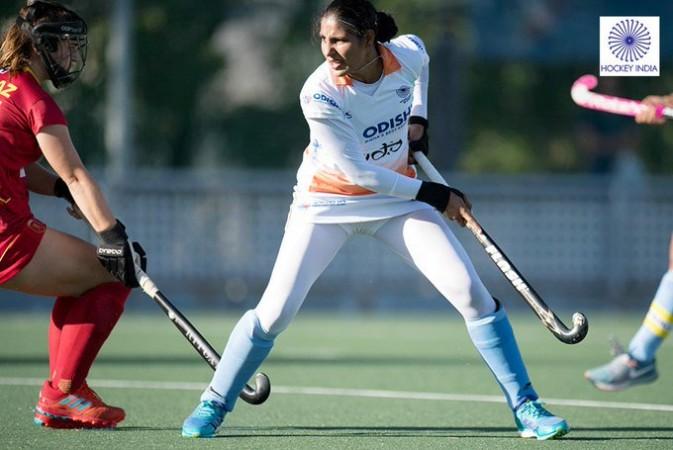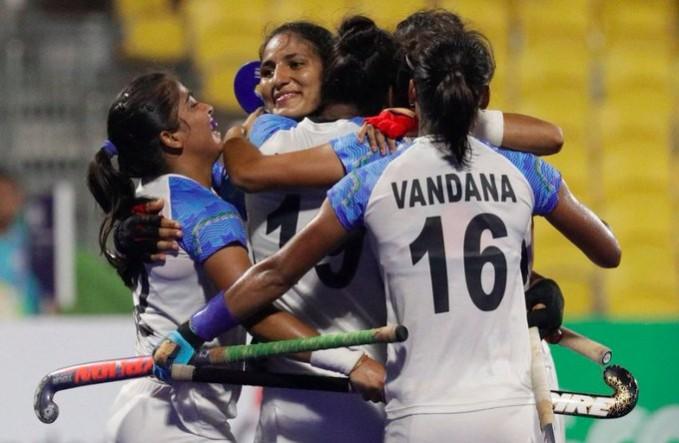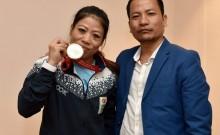
It's hard for any top-level hockey side to succeed without having an efficient penalty-corner specialist. Thankfully for India, the women's team have found one such player in the form of Gurjit Kaur. The strong Punjabi kudi has been scoring prolifically in the last couple of years and only seems to be getting better.
In this exclusive interview with Akshay Saraswat of International Business Times, India, the 23-year old discusses her recent success, team's challenges and the role of a defender in modern-day hockey.
In the FIH Series Finals held in Hiroshima, you were the leading goal-scorer. Was that the biggest achievement of your career?
Gurjit: Yes because in this tournament, I scored 11 goals whereas in Asian Games, I had 10. In Asia Cups, I had 8 goals in 2017 edition, 10 in 2018 and 11 in this year's event. So, yes, this was a big achievement.
In earlier days, almost all drag-flickers used to be defenders. But that has changed now. Why was it so earlier?
Gurjit: Earlier, people used to prefer defenders because they are generally strong. Even for direct hits, they were the chosen ones. But now every player is playing all over the pitch, so, becoming a drag flicker isn't that difficult.
You mentioned that defenders are generally strong. So, as a defender yourself, do you try to make yourself stronger also, apart from working on your skills?
Gurjit: Yes, because if you look at foreign teams, their girls use their body a lot. So, we also have to train in keeping with that style. We also enjoy that a lot.

But the foreign players do indulge in a lot of body play. We practice in a similar way so that in a match or in a tournament, we don't have any difficulties.
There is training for everything. Whether one is a striker, defender or midfielder, they are all given the right training according to their position and situation.
It has been said that there is special emphasis being laid upon the defence of the team by Coach Sjoerd Marijne since the attacking front is anyways good. Do you feel that your team's defence capabilities have improved in the last one year or so?
Gurjit: Definitely, the girls have improved a lot compared to before. Earlier, we weren't that good but now, have improved a lot. Strikers have also shown a lot of improvement, so have defenders. The whole team has worked a lot on improving their game.
In the final of FIH Series Finals, Rani took the penalty corner shot to score the first goal. Who decides and how is it decided which player will take the shot and what kind of shot or variation will be used?
Gurjit: The coach decides, when the team meeting takes place, which method to use in penalty corners. Since we had played against Japan earlier as well, so both I and Rani were at the castles. Their focus was on me because I am the drag-flicker and my being in that position convinced them that we would go for the drag-flick. But our coach made a slight change to surprise them and that's why Rani took the shot.
Since your team had lost to Japan in the Asian Games final last year, was there added determination to not let Japan get an opportunity of getting back in the match and keeping things in full control?
Gurjit: Certainly, because we had lost to them in the Asian Games. So, there was a little feeling of vengeance inside us, as well as some pressure that we had lost to them earlier so winning this match is very important. We cannot lose to them this time! Our entire team and coaching staff had decided the game plan. So, we had gone in to the match with that and the determination that we have to win.

There is a new system of penalty shootouts that has come into place in the last few years. Do you also like to participate in them or leave it to the strikers and midfielders?
Gurjit: We have special training for it in our camps and only those who are best in it are picked to do the job in matches also. It is not necessary that only the strikers are eligible for selection and defenders are excluded. So, currently, while the training is going on, the coach looks at who are the best and most confident players in that situation. Then only he decides whom to send into the match.
Would you personally like to take part in these penalty shootouts?
Gurjit: I don't participate as of now but other members of the team are good and those who have confidence are given the responsibility. I take the penalty strokes. I am confident about them so I am sent for those. But for the 8-second foray, we have good strikers who are sent.
Punjab was always known as a great state for hockey. What about the state of women's hockey in Punjab? How strong is the culture of hockey in Punjab, overall?
Gurjit: In recent times, it has weakened considerably. Earlier it used to be very strong but now, there aren't that many players. Currently, in the junior's camp also, there are only 2-3 and in seniors also, there are only 2. So, compared to earlier times, the craze for hockey is much less, including among girls.
What is the reason for this?
Gurjit: The main reasons are, we don't get good facilities like gym, proper diets, coaching etc. There aren't enough coaching centres or grounds with astro-turfs. These are the main reasons.
Haryana seems to be doing quite well in sports and there seem to be good enough facilities to tap the natural talent there. Do you think Punjab has been left behind in that department?
Definitely, because earlier, Punjab also used to have many players, in the girls team as well. But nowadays, there are very few because, while Haryana has a lot of good facilities, turfs, centres and academies, Punjab doesn't have those things, they are finished.

What can the government do to revive the culture of hockey in Punjab which you say has been withering away?
Gurjit: The government should pay more attention and provide good facilities to the players. Then only players, especially young ones can come out and play. There should be grounds and astro-turf based grounds. Good, nutritious food should be available. All these facilities should be provided so that young players feel like coming out to play.
How did you get involved with hockey?
Gurjit: I was in school at the time. In 2006, I was living in the hostel of Kairon School in Amritsar. That's where I started playing hockey. But I wasn't serious at the time and didn't know anything about hockey then. We had gone there just to study.
Then, slowly, slowly, I kept developing as a hockey player. I was in 12th standard in 2012 when, for the first time, I was selected for the Indian junior team camp. I remained in the junior camp for some time and after that, got selected for the senior camp in 2014. My first tour was also with the senior team, in 2014. In 2016, I was left out, then returned in 2017. Since then, I have continuously been in the team.
How and when did you become a defender?
Gurjit: I used to play in all positions. In the camp, they played and assessed players' skills at all positions. When the coaches feel that you can play best at a certain position, they assign it to you. The same thing happened with me. After I was tried at different positions in the field, the coaches felt I could play well in defence and I was made into a defender.
What are the expectations of your current coach from you and the defenders in general? Are you lot expected to assist in attacking as well apart from doing your usual defensive work?
Gurjit: When the team goes into attack, the whole team has to go into attack. It can't be that only the attackers and midfielders go forward and the defenders just stand behind. So, we also go ahead to support them. Similarly, strikers also move back to help the defenders. The whole team helps each other out. The entire team moves up and down.
But if your team is leading by 2-3 goals and very little time is remaining, would you then be expected to stay behind just in case there is a counter-attack?
Gurjit: No, in that situation, our goal is to hold on to the ball as long as possible. We have almost won but that doesn't mean that we have to play completely defensively in our own half. We will attack and still press high. If we pull back, it will increase the pressure on us. If we have the ball, then, how do we hold on to it and how do we give it to the strikers so that more goals can be scored, that's what we try.














